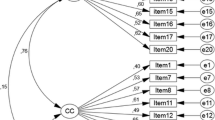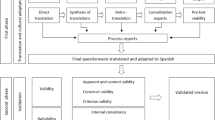Abstract
Assessment of students’ attitudes towards physicians’ empathy is essential in medical education and in practice because empathy is vital in physician-patient communication. To cross-culturally adapt the Jefferson Scale of Physician Empathy (S-version, JSPE-S) into a German version, examine its psychometric properties in comparison to the original US version (psychometric equivalence), and to compare the level of attitude towards empathy to the original US version and to other cultural adaptations. The German version was administered to the 2010 2nd year medical students cohort at the Medical University of Vienna, Austria (n = 516). Item-total score correlations were all positive. Reliability was high (Cronbach’s alpha = .82); a 6–7 weeks test–retest correlation for a subsample was .45. In an explanatory factor analysis, a four-factor solution emerged and is akin to published results of the original JSPE-S. This study provides an example of successful cross-cultural adaptation of an assessment instrument. The German adaptation of the JSPE at hand will pave the way for future international research regarding the concept of empathy and its outcomes.
Similar content being viewed by others
Notes
At the time of preparing this study, no formal framework for ethical approval on studies with educational background existed at our institution. Ethical considerations and approvals were made by persons not directly involved in preparing this manuscript. Individuals were not identifiable; no plausible harm arose from publication.
References
Accreditation Council for Graduate Medical Education. (2004). Advancing education in medical professionalism: An educational resource from the ACGME Outcome Project. Retrieved Jan 11, 2010 from http://www.acgme.org/outcome/implement/Profm_resource.pdf.
Ajzen, I. (1991). The theory of planned behavior. Organizational Behavior and Human Decision Processes, 50, 179–211.
Alcorat-Garza, A., González-Guerrero, J. F., Tavitas-Herrera, S. E., Rodríguez-Lara, F. J., & Hojat, M. (2005). Validity of the Jefferson Scale of Physician Empathy among Mexican medical students [in Spanish]. Salud Mental, 28, 57–63.
American Educational Research Association, American Psychological Association, & National Council on Measurement in Education. (1999). Standards for educational and psychological testing. Washington, DC: American Educational Research Association.
Carifio, J., & Perla, R. J. (2007). Ten common misunderstandings, misconceptions, persistent myths and urban legends about Likert scales and Likert response formats and their antidotes. Journal of Social Sciences, 3(3), 106–116.
Carifio, J., & Perla, R. J. (2008). Resolving the 50-year debate around using and misusing Likert scales. Medical Education, 42(12), 1150–1152.
Chen, D., Lew, R., Hershman, W., & Orlander, J. (2007). A cross-sectional measurement of medical student empathy. Journal of General Internal Medicine, 22(10), 1434–1438.
Colliver, J. A., Conlee, M. J., Verhulst, S. J., & Dorsey, J. K. (2010). Reports of the decline of empathy during medical education are greatly exaggerated: A reexamination of the research. Academic Medicine, 85(4), 588–593.
Di Lillo, M., Cicchetti, A., Scalzo, A. L., Taroni, F., & Hojat, M. (2009). The Jefferson Scale of Physician Empathy: Preliminary psychometrics and group comparisons in Italian physicians. Academic Medicine, 84(9), 1198–1202.
Frank, J. R. (Ed.). (2005). The CanMEDS 2005 physician competency framework. Better standards. Better physicians. Better care. Ottawa: The Royal College of Physicians and Surgeons of Canada.
Hirsch, E. M. (2007). The role of empathy in medicine: A medical student’s perspective [Electronic Version]. Virtual Mentor American Medical Association Journal of Ethics, 9, 423–427. Retrieved Nov 10, 2011, from http://virtualmentor.ama-assn.org/2007/06/pdf/medu1-0706.pdf.
Hofstede, G. (2001). Lokales denken, globales handeln (2nd ed.). München: Deutscher Taschenbuch Verlag.
Hojat, M. (2007). Empathy in patient care: Antecedents, development, measurement, and outcomes. New York: Springer.
Hojat, M., Gonnella, J. S., Mangione, S., Nasca, T. J., Veloski, J. J., Erdmann, J. B., et al. (2002a). Empathy in medical students as related to academic performance, clinical competence and gender. Medical Education, 36(6), 522–527.
Hojat, M., Gonnella, J. S., & Maxwell, K. (2009a). Jefferson Scales of Empathy (JSE). Professional manual and user’s guide (December (2009th ed.). Philadelphia: Jefferson Medical College.
Hojat, M., Gonnella, J. S., Nasca, T. J., Mangione, S., Veloski, J. J., & Magee, M. (2002b). The Jefferson Scale of Physician Empathy: Further psychometric data and differences by gender and specialty at item level. Academic Medicine, 77(10), S58–S60.
Hojat, M., Gonnella, J. S., Nasca, T., Mangione, S., Vergare, M., & Magee, M. (2002c). Physician empathy: Definition, components, measurement, and relationship to gender and specialty. American Journal of Psychiatry, 159, 1563–1569.
Hojat, M., Louis, D. Z., Markham, F. W., Wender, R., Rabinowitz, C., & Gonnella, J. S. (2011). Physicians’ empathy and clinical outcomes for diabetic patients. Academic Medicine, 86, 359–364.
Hojat, M., Mangione, S., Nasca, T. J., Cohen, M. J. M., Gonnella, J. S., Erdmann, J. B., et al. (2001). The Jefferson Scale of Physician Empathy: Development and preliminary psychometric data. Educational and Psychological Measurement, 61(2), 349–365.
Hojat, M., Mangione, S., Nasca, T. J., Gonnella, J. S., & Magee, M. (2005). Empathy scores in medical school and ratings of empathic behavior in residency training 3 years later. The Journal of Social Psychology, 145(6), 663–672.
Hojat, M., Mangione, S., Nasca, T. J., Rattner, S., Erdmann, J. B., Gonnella, J. S., et al. (2004). An empirical study of decline in empathy in medical school. Medical Education, 38, 934–941.
Hojat, M., Vergare, M. J., Maxwell, K., Brainard, G., Herrine, S. K., Isenberg, G. A., et al. (2009b). The devil is in the third year: A longitudinal study of erosion of empathy in medical school. Academic Medicine, 84(9), 1182–1191.
Holz-Ebeling, F., & Steinmetz, M. (1995). Wie brauchbar sind die vorliegenden Fragebögen zur Messung von Empathie? Kritische Analysen unter Berücksichtigung der Iteminhalte [How useful are the current empathy questionnaires? Critical analyses taking item content into consideration]. Zeitschrift für Differentielle und Diagnostische Psychologie, 16(1), 11–32.
International Test Commission. (2010). International test commission guidelines for translating and adapting tests. Version 2010. Retrieved June 7, 2010.
Kataoka, H. U., Koide, N., Ochi, K., Hojat, M., & Gonnella, J. S. (2009). Measurement of empathy among Japanese medical students: Psychometrics and score differences by gender and level of medical education. Academic Medicine, 84(9), 1192–1197.
Kliszcz, J., Nowicka-Sauer, K., Trzeciak, B., Nowak, P., & Sadowska, A. (2006). Empathy in health care providers—validation study of the Polish version of the Jefferson Scale of Empathy. Advances in Medical Sciences, 51, 219–225.
Kunyk, D., & Olson, J. K. (2001). Clarification of conceptualization of empathy. Journal of Advanced Nursing, 35(3), 317–325.
Mercer, S. W., & Reynolds, W. J. (2002). Empathy and quality of care. British Journal of General Practice, 52(suppl.), S9–S12.
Newton, B. W., Barber, L., Clardy, J., Cleveland, E., & Patricia, O. S. (2008). Is there hardening of the heart during medical school? Academic Medicine, 83(3), 244–249.
Norfolk, T., Birdi, K., & Walsh, D. (2007). The role of empathy in establishing rapport in the consultation: A new model. Medical Education, 41, 690–697.
Norman, G. R. (2010). Likert scales, levels of measurement and the “laws” of statistics. Advances in Health Science Education, 15, 625–632.
Pedersen, R. (2009). Empirical research on empathy in medicine—a critical review. Patient Education and Counseling, 76(3), 307–322.
Rabow, M., Wrubel, J., & Remen, R. N. (2009). Promise of professionalism: Personal mission statements among a national cohort of medical students. Annals of Family Medicine, 7(4), 336–342.
Rahimi-Madiseh, M., Tavakol, M., Dennick, R., & Nasiri, J. (2010). Empathy in Iranian medical students: A preliminary psychometric analysis and differences by gender and year of medical school. Medical Teacher, 32, e471–e478.
Rakel, D., Barrett, B., Zhengjun, Z., Hoeft, T., Chewning, B., Marchand, L., et al. (2011). Perception of empathy in the therapeutic encounter: Effects on the common cold. Patient Education and Counseling, (in press).
Rogers, C. R. (1975). Empathic: An unappreciated way of being. Counselling Psychologist, 5, 2–11.
Roh, M.-S., Hahm, B.-J., Lee, D. H., & Suh, D. H. (2010). Evaluation of empathy among Korean medical students: A cross-sectional study using the Korean version of the Jefferson Scale of Physician Empathy. Teaching and Learning in Medicine, 22(3), 167–171.
Shapiro, J. (2002). How do physicians teach empathy in the primary care setting? Academic Medicine, 77(4), 323–328.
Shapiro, J. (2011). Perspective: Does medical education promote professional alexithymia? A call for attending to the emotions of patients and self in medical training. Academic Medicine, 86(3), 326–332.
Shariat, S. V., Eshtad, E., & Ansari, S. (2010). Empathy and its correlates in Iranian physicians: A preliminary psychometric study of the Jefferson Scale of Physician Empathy. Medical Teacher, 32, e417–e421.
Stern, D. T. (Ed.). (2006). Measuring medical professionalism. New York: Oxford University Press.
Van de Vijver, F., & Hambleton, R. K. (1996). Translating tests: Some practical guidelines. European Psychologist, 1(2), 89–99.
Wallace, D. S., Paulson, R. M., Lord, C. G., & Bond, C. F., Jr. (2005). Which behaviors do attitudes predict? Meta-analyzing the effects of social pressure and perceived difficulty. Review of General Psychology, 9(3), 214–227.
Wispé, L. G. (1986). The distinction between sympathy and empathy: To call forth a concept, a word is needed. Journal of Personality and Social Psychology, 50(2), 314–321.
Yu, J., & Kirk, M. (2009). Evaluation of empathy measurement tools in nursing: Systematic review. Journal of Advanced Nursing, 65(9), 1790–1806.
Acknowledgments
The authors would like to thank Michael Schmidts for enabling the data acquisition; Ulrike Leiss, Renate Dosanj, and Alexander Gaiger for reviewing and refining the translation and back translation of the Jefferson Scale of Physician Empathy; and Mohammedreza Hojat for his support during the translation and adaptation process and the critical review of a first version of this paper.
Conflict of interest
None.
Author information
Authors and Affiliations
Corresponding author
Rights and permissions
About this article
Cite this article
Preusche, I., Wagner-Menghin, M. Rising to the challenge: cross-cultural adaptation and psychometric evaluation of the adapted German version of the Jefferson Scale of Physician Empathy for Students (JSPE-S). Adv in Health Sci Educ 18, 573–587 (2013). https://doi.org/10.1007/s10459-012-9393-9
Received:
Accepted:
Published:
Issue Date:
DOI: https://doi.org/10.1007/s10459-012-9393-9




